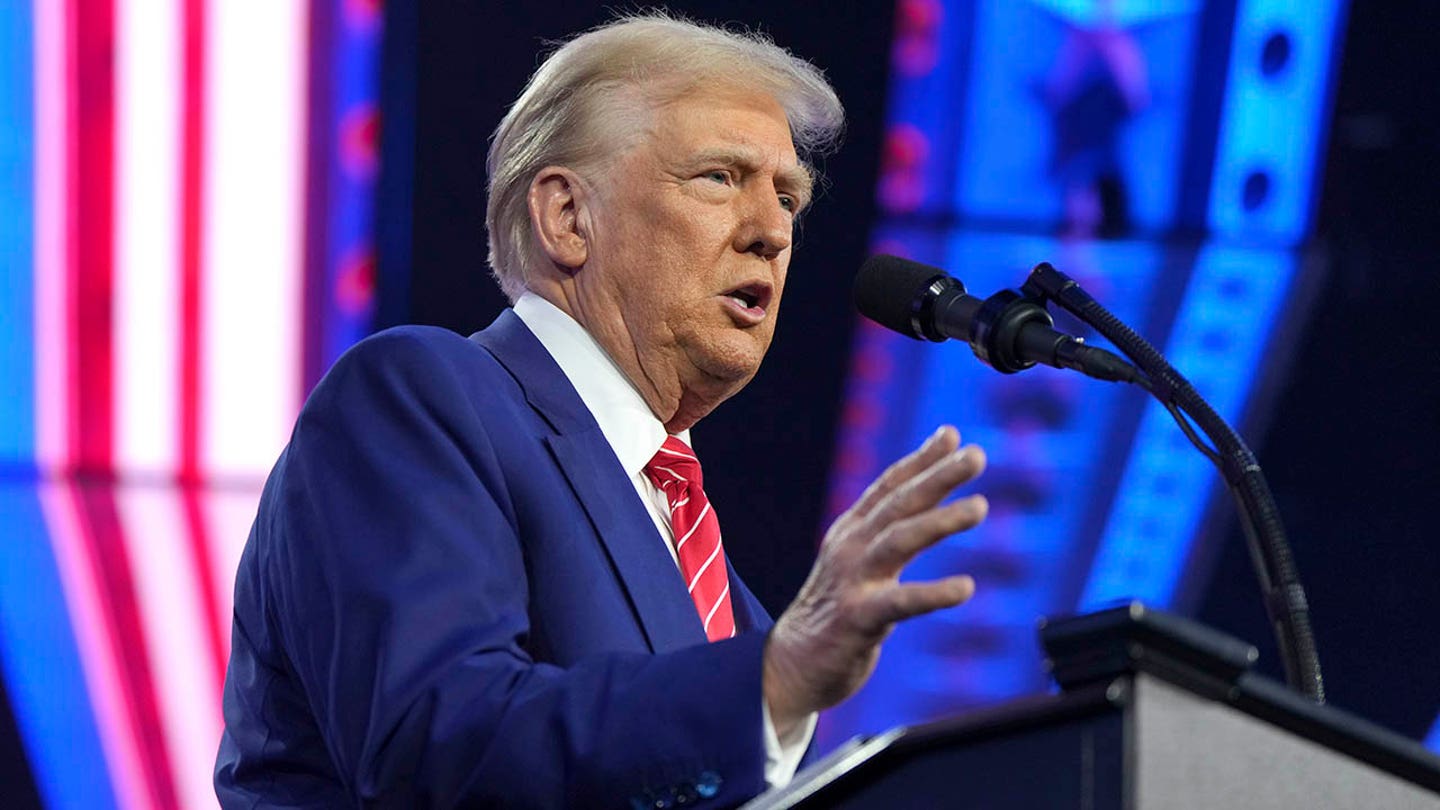
Trump declares 'we got men out of women's sports' as Supreme Court deliberates landmark cases
Entities mentioned:
- Donald Trump: Competitive spirit, Righteousness, Influence
- Supreme Court: Justice, Duty, Legacy
- NCAA: Control, Professional pride, Obligation
- Democrat-controlled states: Moral outrage, Loyalty, Resistance
- Karoline Leavitt: Loyalty, Professional pride, Determination
Article Assessment:
Credibility Score: 65/100
Bias Rating: 70/100 (Lean Right)
Sentiment Score: 55/100
Authoritarianism Risk: 55/100 (Mixed/Neutral)
Bias Analysis:
The article leans right, heavily featuring Trump's perspective and actions. While it mentions opposing views, it gives more weight and detail to the conservative stance on the issue.
Key metric: Gender Equality in Sports
Let me tell you something - this story is HUGE! We're in the championship round of a title fight for women's sports, folks! The Trump administration has come out swinging, delivering a knockout punch to what they see as unfair competition. They've stepped up to the plate and are calling foul on transgender athletes in women's leagues. But hold onto your hats, because we've got some states refusing to play ball! They're digging in their cleats and challenging this game-changing executive order. Now the Supreme Court is the ultimate referee, and they're about to make a call that could change the entire playing field! This is the kind of high-stakes matchup that defines legacies, people. We're talking about a potential game-changer for Title IX and the very definition of fair play in sports. It's fourth and goal, and the whole nation is watching to see who comes out on top in this clash of titans!

Trump tells Grassley to tell Democrats 'go to HELL' over blocked judicial nominees in Senate
Entities mentioned:
- Donald Trump: Power, Control, Indignation
- Chuck Grassley: Duty, Loyalty, Wariness
- Senate Democrats: Control, Resistance, Power
- Alina Habba: Ambition, Professional pride, Self-preservation
- Judge Matthew Brann: Justice, Duty, Professional pride
Article Assessment:
Credibility Score: 70/100
Bias Rating: 55/100 (Center)
Sentiment Score: 30/100
Authoritarianism Risk: 65/100 (Authoritarian Tendencies)
Bias Analysis:
The article presents multiple viewpoints, including Trump's criticism and Grassley's defense of the blue slip tradition. While it gives more space to Trump's perspective, it also includes factual context about the constitutional process and recent judicial rulings.
Key metric: Judicial Branch Appointments
As a social scientist, I analyze that this article highlights a growing tension between executive power and Senate traditions in the judicial appointment process. Trump's frustration with the 'blue slip' custom reflects a broader struggle for control over the judiciary, which has significant implications for the balance of power in the US government. The slowdown in judicial appointments during Trump's current term, compared to his first, indicates a shift in the political landscape and the effectiveness of opposition tactics. This conflict could lead to further polarization in the appointment process and potentially alter long-standing Senate norms, affecting the composition and perceived legitimacy of the federal judiciary in the long term.

Democratic Texas lawmaker passes 24-hour mark on state House floor after refusing GOP demand for law enforcement escort
Entities mentioned:
- Nicole Collier: Righteousness, Determination, Duty
- Dustin Burrows: Control, Power, Duty
- Texas House Democrats: Resistance, Justice, Self-preservation
- Texas Republicans: Power, Control, Ambition
- Beto O'Rourke: Moral outrage, Unity, Recognition
- Greg Abbott: Power, Ambition, Loyalty
- Donald Trump: Influence, Power, Control
- Gavin Newsom: Competitive spirit, Power, Revenge
Article Assessment:
Credibility Score: 75/100
Bias Rating: 45/100 (Center)
Sentiment Score: 35/100
Authoritarianism Risk: 65/100 (Authoritarian Tendencies)
Bias Analysis:
The article presents perspectives from both Democrats and Republicans, quoting multiple sources. While it gives more space to Democratic viewpoints, it includes Republican statements and contextualizes the broader political landscape.
Key metric: Electoral Integrity
As a social scientist, I analyze that this article highlights a significant conflict over redistricting in Texas, which has broader implications for national electoral integrity. The standoff between Democrats and Republicans over proposed redistricting plans underscores the intensifying partisan struggle for control of the U.S. House of Representatives. Rep. Collier's protest against what she perceives as intimidation tactics reflects growing tensions around voting rights and fair representation. The involvement of law enforcement in monitoring legislators' movements raises concerns about the balance of power between branches of government. This situation exemplifies how gerrymandering and redistricting battles are becoming increasingly contentious, with potential long-term impacts on democratic processes and voter representation. The article also reveals how state-level actions can trigger nationwide responses, as seen in California's proposed countermeasures, indicating a broader, more complex challenge to maintaining electoral integrity across the United States.

The common thread in Trump’s latest moves: squeezing big blue cities
Entities mentioned:
- Donald Trump: Power, Control, Revenge
- Democratic Party: Self-preservation, Unity, Resistance
- Republican Party: Power, Control, Loyalty
- ICE: Duty, Control, Security
- National Guard: Duty, Security, Control
- Big Cities: Self-preservation, Resistance, Unity
Article Assessment:
Credibility Score: 70/100
Bias Rating: 35/100 (Lean Left)
Sentiment Score: 25/100
Authoritarianism Risk: 70/100 (Authoritarian Tendencies)
Bias Analysis:
The article leans left, presenting Trump's actions as primarily negative for cities. While it includes some factual information and expert opinions, the language and framing consistently portray Trump's policies as harmful to urban areas and beneficial to his political goals.
Key metric: Urban-Rural Political Divide
As a social scientist, I analyze that this article highlights a growing trend of federal intervention in urban governance, potentially exacerbating the urban-rural political divide in the United States. The actions described, such as deploying federal forces to cities and redistricting efforts, appear to be systematically reducing the political influence of large metropolitan areas. This could lead to decreased representation for urban populations in national politics, despite their significant contributions to economic growth and innovation. The approach may also intensify social tensions and challenge the traditional balance of federal-local power dynamics in the US political system.

Democratic Texas lawmaker spent night on state House floor after refusing GOP demand for law enforcement escort
Entities mentioned:
- Nicole Collier: Righteousness, Determination, Self-respect
- Dustin Burrows: Control, Power, Duty
- Texas House Democrats: Resistance, Justice, Unity
- Texas Republicans: Power, Control, Ambition
- Beto O'Rourke: Moral outrage, Righteousness, Loyalty
- Greg Abbott: Power, Ambition, Loyalty
- Donald Trump: Influence, Power, Control
- Gavin Newsom: Competitive spirit, Justice, Power
Article Assessment:
Credibility Score: 75/100
Bias Rating: 55/100 (Center)
Sentiment Score: 35/100
Authoritarianism Risk: 65/100 (Authoritarian Tendencies)
Bias Analysis:
The article presents both Republican and Democratic perspectives, but gives slightly more space to Democratic viewpoints and actions. The framing of Republicans' actions as 'demands' and Democrats as 'protesting' suggests a slight lean towards sympathizing with the Democrats.
Key metric: Electoral Integrity
As a social scientist, I analyze that this article highlights a significant conflict over redistricting in Texas, which has broader implications for national electoral integrity. The Republican-led effort to redraw congressional maps mid-decade is an unusual move that could significantly alter the balance of power in the U.S. House of Representatives. This situation demonstrates the intensifying partisan struggle over electoral maps, with both parties engaging in tactical maneuvers to gain advantage. The Democrats' initial flight from the state and subsequent return under restrictive conditions illustrates the lengths to which political actors will go to influence the redistricting process. Rep. Collier's protest against the imposed restrictions symbolizes broader resistance to what Democrats perceive as an abuse of power. This conflict over redistricting could erode public trust in the electoral system and potentially lead to more extreme gerrymandering practices across the country, ultimately impacting the fairness and representativeness of elections.

Trump announces Kennedy Center honorees as he tries to put his stamp on DC
Entities mentioned:
- Donald Trump: Power, Control, Legacy
- Kennedy Center: Professional pride, Influence, Recognition
- Republican Party: Loyalty, Power, Control
- Democratic Party: Righteousness, Moral outrage, Resistance
- Washington, DC: Self-preservation, Freedom, Unity
Article Assessment:
Credibility Score: 70/100
Bias Rating: 45/100 (Center)
Sentiment Score: 35/100
Authoritarianism Risk: 65/100 (Authoritarian Tendencies)
Bias Analysis:
The article presents a balanced view of events, including both Trump's actions and criticisms from opponents. While it leans slightly towards emphasizing concerns about Trump's interventions, it also includes his justifications and supporters' viewpoints.
Key metric: Government Control Over Cultural Institutions
As a social scientist, I analyze that this article highlights a significant shift in the relationship between the federal government and cultural institutions in Washington, DC. Trump's aggressive moves to exert control over the Kennedy Center and other DC institutions represent an unprecedented level of federal intervention in traditionally independent cultural spaces. This could have far-reaching implications for artistic freedom, cultural expression, and the separation of politics from the arts. The article suggests a potential politicization of cultural institutions, which may lead to changes in programming, funding, and leadership that align more closely with the current administration's ideology. This shift could impact the diversity of artistic voices and perspectives represented in these institutions, potentially altering the cultural landscape of the nation's capital and, by extension, the country.

Why Trump’s Texas battle over the House could end up affecting every American
Entities mentioned:
- Donald Trump: Power, Control, Ambition
- Democratic Party: Competitive spirit, Self-preservation, Justice
- Republican Party: Power, Control, Competitive spirit
- Texas State Lawmakers (Democratic): Righteousness, Determination, Resistance
- Kathy Hochul: Competitive spirit, Determination, Power
- Gavin Newsom: Ambition, Competitive spirit, Justice
- Greg Abbott: Loyalty, Power, Control
- Mike Johnson: Power, Loyalty, Control
Article Assessment:
Credibility Score: 65/100
Bias Rating: 35/100 (Lean Left)
Sentiment Score: 30/100
Authoritarianism Risk: 55/100 (Mixed/Neutral)
Bias Analysis:
The article leans slightly left, focusing more on Democratic perspectives and strategies. While it mentions Republican actions, it frames them more negatively and gives more space to Democratic justifications.
Key metric: Electoral Integrity
As a social scientist, I analyze that this article highlights a significant escalation in the ongoing battle over redistricting and its impact on electoral integrity in the United States. The Democrats' shift towards more aggressive tactics in response to Republican gerrymandering efforts in Texas represents a potential turning point in how both parties approach electoral map-drawing. This development could have far-reaching consequences for the balance of power in the House of Representatives and the overall health of American democracy. The article suggests that Democrats are abandoning previous commitments to nonpartisan redistricting commissions in favor of a more combative approach, mirroring Republican tactics. This shift indicates a growing concern among Democrats about losing ground in the electoral landscape and a willingness to engage in similar practices they have previously criticized. The potential for a 'race to the bottom' in gerrymandering could further erode public trust in the electoral system and exacerbate political polarization. The focus on Texas as a battleground for this issue underscores the state's importance in national politics and its role as a bellwether for broader trends in electoral strategy.